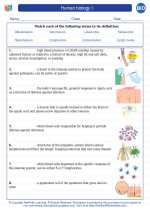Diversity in Biology
Diversity in biology refers to the variety of different species, genes, and ecosystems present in a particular region or on Earth as a whole. It is a fundamental aspect of life on Earth and is essential for the stability and functioning of ecosystems. Biological diversity can be studied at multiple levels including genetic diversity, species diversity, and ecosystem diversity.
Genetic Diversity
Genetic diversity refers to the variety of genes within a population or a species. It is important for the adaptation and survival of a species in changing environments. Higher genetic diversity can provide a greater range of traits that may be advantageous in the face of environmental changes or new challenges. Genetic diversity is also crucial for the long-term survival of a species, as it provides the raw material for evolutionary processes.
Species Diversity
Species diversity refers to the variety of different species in a particular area. It includes the number of different species present as well as the relative abundance of each species. High species diversity is often associated with greater ecosystem stability and resilience. It also contributes to the overall functioning of an ecosystem, as different species play different roles in processes such as nutrient cycling, predation, and pollination.
Ecosystem Diversity
Ecosystem diversity refers to the variety of different ecosystems within a larger area. An ecosystem is a community of living organisms interacting with each other and their physical environment. Ecosystem diversity encompasses a range of different habitats, such as forests, grasslands, wetlands, and coral reefs. Each type of ecosystem has its own unique set of species and environmental conditions, and the diversity of ecosystems contributes to the overall health and resilience of the biosphere.
Importance of Diversity
Diversity is crucial for the functioning and stability of ecosystems. It provides resilience in the face of environmental changes, helps in the provision of ecosystem services such as pollination and water purification, and contributes to the overall health of the planet. Human activities have led to a significant loss of biodiversity through habitat destruction, pollution, and climate change, making it important to understand and conserve diversity in all its forms.
Study Guide
- Define genetic diversity and explain its importance in evolutionary processes.
- Compare and contrast species diversity and ecosystem diversity, providing examples of each.
- Discuss the impact of human activities on biodiversity and propose potential solutions for conservation.
- Research a specific case study of biodiversity loss and its consequences for ecosystems and human societies.
- Examine the concept of resilience in ecosystems and explain how biodiversity contributes to resilience.
[Diversity] Related Worksheets and Study Guides:
.◂Biology Worksheets and Study Guides High School. Human biology I

 Worksheet/Answer key
Worksheet/Answer key
 Worksheet/Answer key
Worksheet/Answer key
 Worksheet/Answer key
Worksheet/Answer key
 Vocabulary/Answer key
Vocabulary/Answer key
 Vocabulary/Answer key
Vocabulary/Answer key
 Vocabulary/Answer key
Vocabulary/Answer key
 Vocabulary/Answer key
Vocabulary/Answer key
 Vocabulary/Answer key
Vocabulary/Answer key
 Vocabulary/Answer key
Vocabulary/Answer key
 Vocabulary/Answer key
Vocabulary/Answer key
